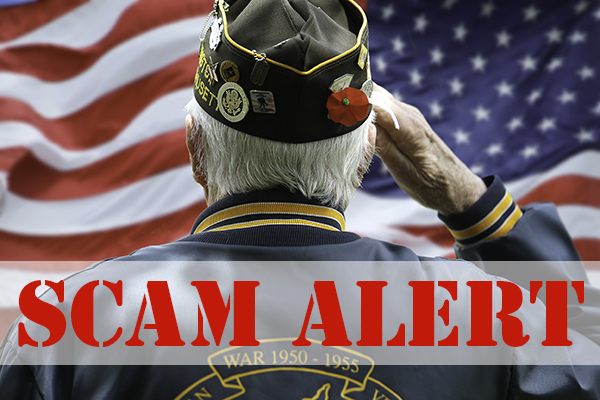
The FTC (Federal Trade Commission) said that since 2015 they have received 163,000 fraud reports from military veterans.
Veterans are often targeted because they receive regular compensation benefits. A 2017 survey done by AARP showed that veterans are twice as likely to be scammed when compared with the general population. AARP reported that 16% of veterans said they lost money to fraud and 78% said that the scams were clearly designed to exploit their military service.
Here are some common scams to be aware of.
Fake Charity Requests
Criminals trick veterans into donating money to charities that aid veterans and their families. They know that veterans are very willing to help other veterans in need.
What to Know
Never respond to charity requests you receive by phone, text, or email. If you want to donate to a charity, contact them directly. You can use Charity Navigator or Give.org to research legitimate charities.
Paying for Records and Reports
Scammers may call or text you or setup fake websites to trick you into paying for military and medical records. Dishonest businesses also target veterans attempting to charge fees for copies of their records.
What to Know
Never pay for your military or medical records. Contact the VA directly to obtain free copies. Request Military Service Records National Archives
Benefit Buyouts
A scammer may call or text and offer a lump-sum payment in exchange for turning over your VA pension or disability benefits. Or they may claim to be an investment advisor or pension fund manager and tell you that you can receive a larger pension payment in return for an upfront payment. If you pay the fee your money is gone and often so are your benefits.
What to Know
This is always a scam. Never respond to anyone asking for money, pension, or benefit information. If you have questions about your benefits, contact the VA directly.
U.S Department of Veterans Affairs
Security Deposit Payments for Veteran Discounted Properties
Scammers post ads on social media and other sites for property sales or rentals that offer discounts for veterans and their families. They may offer to show you the property in person or virtually but ask for a security deposit or down payment first.
What to Know
Never pay any kind of deposit or fee ahead of time. Don’t respond to ads posted on social media, these are almost always a scam. If you are in the market to buy or acquire a rental, contact a local, licensed real estate agent. Visit Housing Help for Veterans to find resources to help veterans obtain housing or visit the VA website for home loan information. U.S. Department of Veterans Affairs
Government Official Imposters
Scammers may contact you pretending to be from The Department of Veterans Affairs, The United States Army Criminal Investigation Division, The Defense Finance & Accounting Service, or another government agency. They may ask for personal or financial information to verify your identity. They may reference a data breech and tell you to provide the information so that they can make sure you have not been part of the breech.
What to Know
Never provide any kind of personal or financial information to anyone who contacts you by phone, text message or email. Instead contact the agency directly at a number you know to be true.
Warning Signs of Veteran Scams
Phone calls from someone claiming to be from the VA. Don’t respond to these calls. Instead hang up and call the VA directly. And don’t trust the caller ID. Scammers can spoof phone numbers making them appear legitimate.
Someone contacts you requesting payment for your military or medical records or other information related to your service.
Phone calls, text messages or email’s requesting charity donations.
Someone contacting you asking for any type of personal or financial information.
Any type of message that seems urgent or threatening. Government agencies will never intimidate or pressure you.
An unsolicited call or message offering to help you increase your benefits.
Someone contacts you offering to help you sign up for a government program or offering discounts specifically for veterans.
You receive a letter or email message from the VA telling you that your direct deposit or eBenefits account was updated or notifying you of a claim you did not file. This can be a sign that your identity has been stolen. Contact the VA if this happens.
Stay informed by visiting FTC Military Consumer Protection
If you have been the victim of an internet related scam file a complaint with the FBI’s Internet Crime Complaint Center (IC3)
Report the fraud to the Federal Trade Commission
You can also contact your local police department and your State Attorneys General Office.
